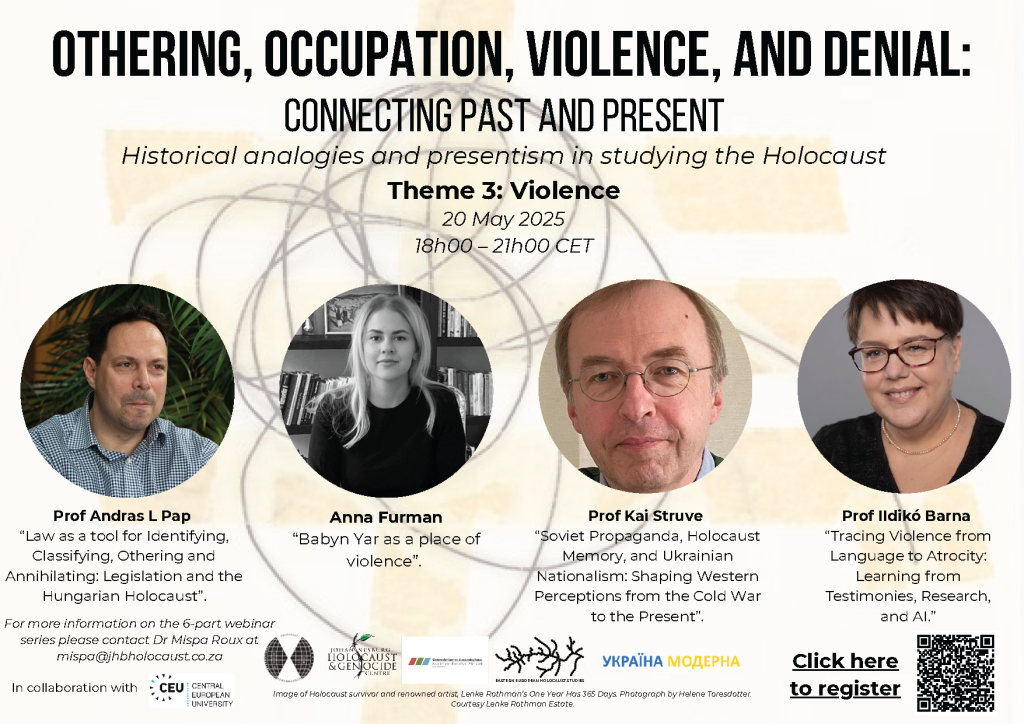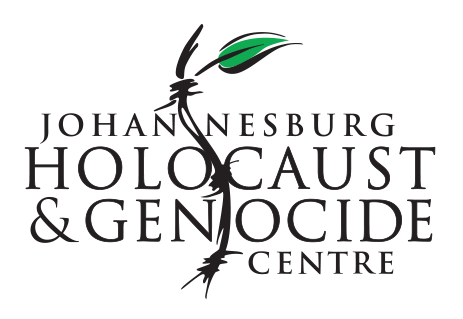20 May 2025 @ 6:00 pm – 9:00 pm

INTERNATIONAL HOLOCAUST REMEMBRANCE ALLIANCE GRANT PROGRAM WINNER 2023
Join us for the IHRA Webinar Series, in collaboration with the Johannesburg Holocaust & Genocide Centre (JHGC), Eastern European Holocaust Studies: Interdisciplinary Journal of the Babyn Yar Holocaust Memorial Center (EEHS), Ukraina Moderna website (UM), and Austrian Service Abroad (ASA) on the theme of “Othering, Occupation, Violence, and Denial”. Topics that will be engaged with under the central theme include the way in which historical analogies and presentism in studying the history of the Holocaust are used to foster deeper understanding and critical thinking about the Holocaust, current armed conflicts and the rise of hate speech. Ways in which oversimplifications, misrepresentations, distortions, and denial of these topics can be challenged and safeguarded against will also be grappled with, alongside testimonies, resistance, education, remembrance, and the collection and preservation of history.
This third webinar in the series deals with the theme of Violence, featuring speakers: Prof Andras L Pap on “Law as a tool for Identifying, Classifying, Othering and Annihilating: Legislation and the Hungarian Holocaust”, Anna Furman on “Babyn Yar as a place of violence”, Prof Kai Struve on
“Soviet Propaganda, Holocaust Memory, and Ukrainian Nationalism: Shaping Western Perceptions from the Cold War to the Present”, and Prof IIdikó Barna on “Tracing Violence from Language to Atrocity: Learning from Testimonies, Research, and AI.”
András L. Pap is Research Professor and Head of Department for Constitutional and Administrative Law at the (formerly Hungarian Academy of Sciences, currently) HUN-REN Centre for Social Sciences, Institute for Legal Studies, as well as Professor of Law at the Faculty of Economics at Eötvös University (ELTE) in Budapest. For 25 years, until its recent closing in 2025, he was Adjunct (Recurrent Visiting) Professor in the Nationalism Studies Program at the Central European University (CEU) in Budapest and Vienna. A former visiting scholar at New York University School of Law Global Law Program, and a SASPRO-Marie Skłodowska-Curie Fellow at the Institute of Sociology of the Slovak Academy of Sciences in Bratislava, his research interest include comparative constitutional law, human rights, law enforcement, and the conceptualisation of race and ethnicity. He worked as rapporteur, consultant, senior expert, project manager and lead researcher in various projects commissioned by the European Union, the Council of Europe and the UN. He served as expert witness for courts in the UK and the US and habitually works with international NGO’s and think tanks. He is a member of the Hungarian Helsinki Committee. In 2018 he founded the International Association of Constitutional Law (IACL) Research Group on identity, race and ethnicity in constitutional law. He is also a recurrent evaluator for a variety of EU grants. He has taught over 85 courses, delivered over 250 presentations and published over 100 articles and book chapters in international academic forums.
Anna Furman has been the Chief Executive Officer of the Babyn Yar Holocaust Memorial Center since 2025, with expertise in cultural management, international cooperation, and digital transformation. She brings over a decade of executive experience leading large-scale cultural and social initiatives both in Ukraine and abroad. Under her leadership, the Center digitised over 7 million archival documents, launched the first online martyrology of civilian victims of the war in Ukraine, and received global accolades, including the Red Dot and Webby Awards. Anna co-authored the Center’s artistic vision, curated impactful exhibitions, and led strategic cooperation with state institutions and archives. She is also a prominent international representative of the institution. Prior to her work at Babyn Yar, she held leadership roles in the legal and educational sectors. She has a Master of Laws degree and researches Human Rights.
Kai Struve is a Senior Research Fellow at Ludwig-Maximilian University in Munich and a Privatdozent at the Institute of History of Martin Luther University Halle-Wittenberg. He received his Ph.D. from the Free University of Berlin in 2002 and has previously worked at the Herder Institute in Marburg and the Simon Dubnow Institute for Jewish History and Culture in Leipzig. He has also held fellowships at the United States Holocaust Memorial Museum, the German Historical Institute in Warsaw, and the Université Paris II Panthéon-Assas. His research focuses on the history of Ukraine and Poland in the nineteenth and twentieth centuries, particularly World War II and the Holocaust, but also on questions how societies remember and interpret mass violence in the twentieth century. Among his most important publications are Deutsche Herrschaft, ukrainischer Nationalismus, antijüdische Gewalt. Der Sommer 1941 in der Westukraine, Berlin 2015 (Ukrainian translation: Nimets‘ka vlada, ukraïns‘kyi nacionalizm, nasyl‘stvo proty ievreïv. Lito 1941 roku v Zakhidnii Ukraïni, Kyïv 2022), and the edited volume (with Gelinada Grinchenko): Krieg und Okkupation. Deutschland und die Ukraine 1941-44, Leipzig 2025 (forthcoming).
Ildikó Barna is a sociologist and professor at ELTE University, Faculty of Social Sciences, Department of Social Research Methodology, Budapest. Her research topics include antisemitism, memory politics, post-Holocaust studies, and quantitative research on archival sources. In recent years, her interest has turned to automated text analytics, applying natural language processing to complement traditional quantitative and qualitative approaches in these areas. Dr. Barna has been awarded numerous research grants, including the MTA Bolyai János Research Grant of the Hungarian Academy of Sciences (2017–2020). She has also held several prestigious fellowships, such as the Visiting Research Fellowship at the Malach Centre for Visual History in Prague (2020), the European Holocaust Research Infrastructure (EHRI) Research Fellowship at the Arolsen Archive in Bad Arolsen and the Wiener Holocaust Library in London (2017), and the Visiting Fellowship at the United States Holocaust Memorial Museum in Washington DC (2015). She is the author of numerous publications and, together with her co-authors, received the Károly Polányi Prize from the Hungarian Sociological Association in 2003, 2017, and 2023 for the best publication of the previous year.

